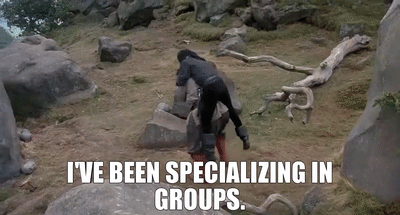TMTOWTDI and expertise
One of the guiding principles of the Perl programming language is TMTOWTDI — there’s more than one way to do it (where “it” is “pretty much anything you want to use Perl to do”). Interestingly, for most (interesting) domains, this is true of expertise, as well.

Wait for it…
I’m still defining expertise as the set of acquired traits that contribute to success in some endeavor — but for whatever domain you’re looking at, there are often multiple strategies that can work. Chess masters tend to specialize in one or another opening in their games (and when they have to look at a different opening, they perform noticeably worse than their ranking would indicate). Beyond openings, players often have distinctive styles: attacking, positional, tricky, and more. If success is just winning the game, there are any number of different ways to go about it.
This can be seen even more clearly in, for instance, team sports. Who’s a better basketball player: a phenomenal point guard or a dominant center? There’s often no clear answer; best-ever lists are a staple of sports bar conversations for a reason, and even the most analytical fans have to resort to complex stats like “value over replacement player” to try to compare people who at times seem to be playing entirely different games.
And then there’s Fezzik:

Well, there’s no way one man could best Montoya. Right?
Most of the research I’ve seen (so far; I’m continuing to read as much and as widely as I can) on expertise has neglected the specialization effect, treating expert performance as if it’s the result of a single, constant set of [something] for all people. Bilalic’s work on chess openings is the only thing that really comes to mind. This makes a lot of sense from a practical standpoint, as adding in strategies as a variable to the studies would make subject groups even smaller than they already are. Still, I worry.
There seems to be a growing trend of researchers investigating expertise in professions (medicine, law, business, etc.), and treating top performers in these fields as if they’ve all built up “the same expertise” is bound to be a mistake. Heck, do you want the best orthopedist in the world doing your brain surgery? She’s an expert doctor, after all!
(And this is just one problem with research in professional expertise — for many professions, measuring “success” is a major challenge. It’s orders of magnitude worse than the point guard / center question from before)
I think the root of all of this is an odd … disregard for the actual nature of expertise in the domains being studied. Deliberate practice, the expert performance research paradigm, and much of the literature tends to skip over the question of the content of expertise, opting instead to look at what it allows subjects to do. That blind spot means that it’s much harder to account for TMTOWTDI effects, and what we end up learning from the research is incomplete.
